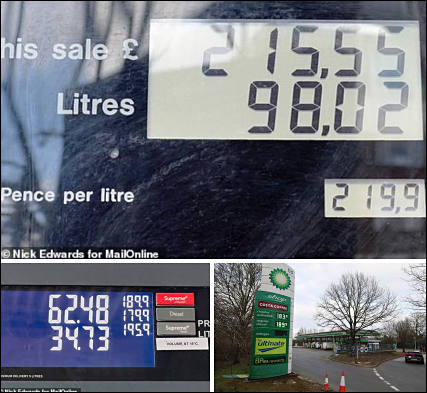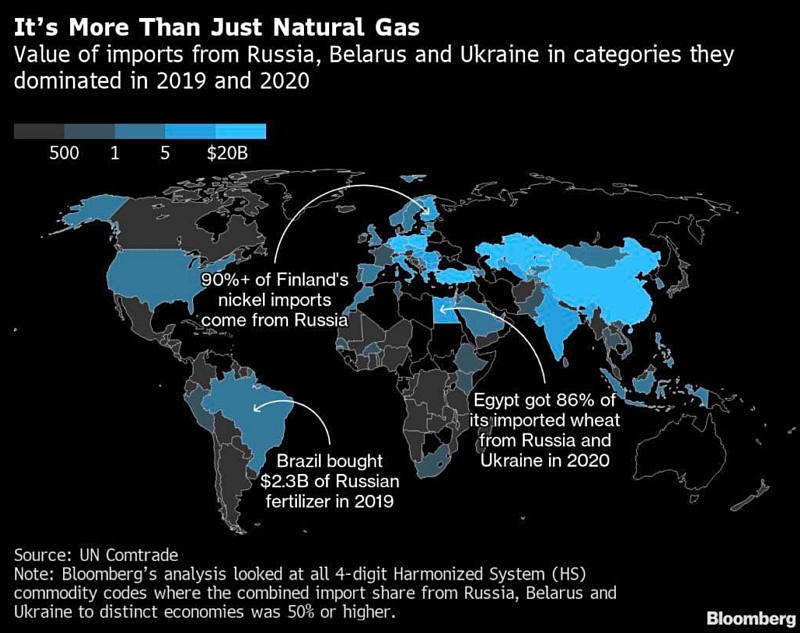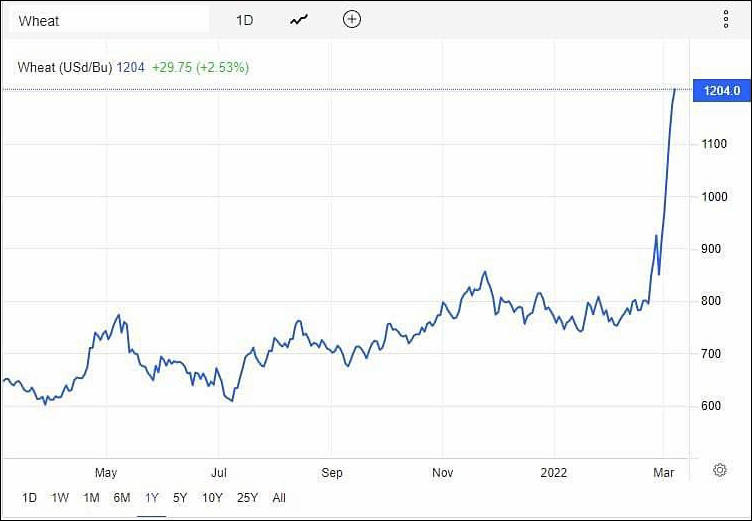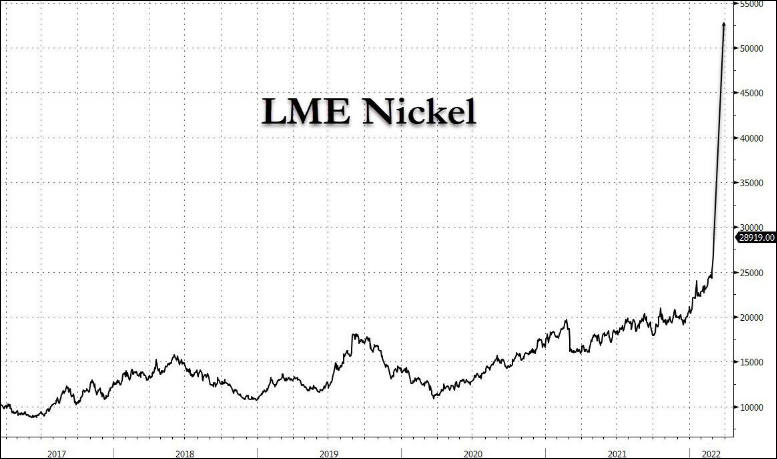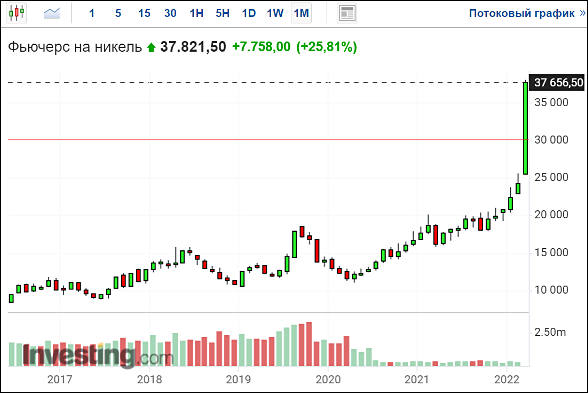
-
The London Metal Exchange said that trading in nickel will not be held today either, as "a sharp increase in quotations creates risks for the market of this metal".
-
Coal prices are skyrocketing, hitting $462 a tonne today, up from $186 on Feb. 23, and likely to top $500 this year, Rystad Energy research suggests.
While much of Europe and around the world have focused on how Russia's war in Ukraine has affected oil, gas and, more recently, nickel prices, relatively little has been written about the coal price shock that is likely to hit across the region and spread like a tsunami around the world.
Russia is the largest supplier of thermal coal to Europe. According to Eurostat, last year Russia supplied 36 million tons of thermal coal to the EU countries, which is 70% of total thermal coal imports. While the volumes have remained about the same level, ten years ago Russian coal imports were half as much and amounted to 35%.
-
Nickel trading has been closed for the second day. Although we are accustomed to the fact that the stock exchange does not work for two weeks, there are some oddities in the raw materials market as well. Tsingshan Holding Group received a margin call on its nickel position for more than $8 billion . It is a large steel corporation in China that has $42bn in revenue and $1.2bn in profits. The short squeeze was so monstrous, more than tripling in prices in a few days, that the big hedgers were wiped out. In order to prevent the bankruptcy of a bunch of broker-clearing agencies and the LME exchange itself, trading was stopped for 4 days until Friday. Margin requirements are being settled with the involvement of large banks in China and the United States.
-
The chairman of the opposition CDU party, Friedrich Merz, called on the German authorities to refuse Russian gas supplies via the Nord Stream 1 gas pipeline, the German magazine Spiegel writes on Wednesday.
"During a discussion on the supply of energy resources from Russia, Friedrich Merz advocated a radical reduction: the leader of the CDU and the chairman of the CDU / CSU parliamentary faction spoke in favor of stopping Russian gas supplies via the Nord Stream 1 gas pipeline," Spiegel quotes Merz's position.
According to the politician, such a move "would represent a new level of sanctions" directed against Russia.
EU people need to suffer.
-
“The combination of higher energy, transport and food prices will increase pressure on low-income households and increase the risk of poverty.” However, “since Russia’s invasion of Ukraine, the case for a rapid transition to clean energy has never been more compelling or clearer.”
It is one small issue - due to all metals and transport prices for the same amount of investments EU could only install from 15 to 25% of originally planned renewable sources. I am not even talking about increases.
-
The sharp rise in energy prices, which is associated with the situation in Ukraine, is leading to a virtual shutdown of many enterprises in the pulp and paper industry in Italy, said Lorenzo Poli, president of the national association of paper, cardboard and pulp producers Assocarta.
"We resisted, even producing at a loss, but these days more and more paper mills stop or limit their production. Even the pandemic did not stop us, but the energy shock that followed the current events between Ukraine and Russia succeeded," he stressed. is he.
Soaring natural gas prices in an energy-intensive industry like the pulp and paper industry require immediate action by the authorities to support production, Poli said. Otherwise, the industry is threatened with a complete halt, because the current cost of gas required to produce one ton of paper exceeds the selling price of this paper.
"If in December Italian paper mills paid five times more for natural gas, which is used to produce electricity, now its cost has increased tenfold on average, and even 15 times at peak times," the head of the association said. .
-
The EU countries in 4-6 weeks will face a shortage of unrefined sunflower oil, caused by the forced stop of its export from Ukraine, which in turn will cause a shortage of refined and bottled oil for European households.
This is stated in the report of the European Association of Producers and Processors of Vegetable Oils and Fats FEDIOL.
“Available stocks in the EU will deplete in an estimated period of four to six weeks. After this period, it is likely that the lack of availability of unrefined sunflower oil and limited alternatives will lead to a shortage of refined/bottled sunflower oil in the European market, and that this shortage will spread to the level retail consumption," the report says.
According to FEDIOL, European oil extraction plants receive 35-45% of raw materials for the production of sunflower oil from Ukraine, the export of which is currently suspended due to hostilities. The organization stressed that it is impossible to replace Ukrainian raw materials in the industry in a short time. Other players in the global market are also facing a similar shortage of supplies.
“FEDIOL members are already foreseeing the problems and are doing everything possible to mitigate the negative impact on the food industry. They are already diverting limited amounts of sunflower oil destined for biodiesel production back to the food market. There is no immediate solution to this problem with sunflower oil,” it says. in the organisation's report.
According to her, it is not clear how and when the supply of raw materials from Ukraine will be able to resume. Depending on the European Union market, future sunflower oil shortages may be mitigated to some extent by alternative vegetable oils such as rapeseed, soybean or palm.
-
News from Italy:
- Paper mills shut down in Italy: packaging sector, toilet paper, medical paper, printing houses, recycling.
- Steel mills shut down.
-
“Half the world’s population gets food as a result of fertilisers… and if that’s removed from the field for some crops, [the yield] will drop by 50%,” Svein Tore Holsether, head of agri company Yara International, told the BBC.
Known as “the breadbasket of Europe,” Russia and Ukraine export around a quarter of the world’s wheat and half of its sunflower products, such as seeds and oil.
“For me, it’s not whether we are moving into a global food crisis – it’s how large the crisis will be,” said Holsether, noting that increasing gas prices were causing a steep rise in the cost of fertiliser.
-
New instructions for Germans
Russian gas is still flowing to Germany, but that could change. Because of the boycott of Russian energy by the West, or because Putin himself turned off the gas valve. Both that, and another would mean: gas becomes even less and it becomes more expensive.
The less natural gas each person consumes, the more reserves there are for everyone. Read more about how to save on gas here:
You can save gas when heating:
- Lower your room temperature, turn down the heat when you leave the house, wear a warm sweater.
- Turn off the heating in unused or underused rooms, for example, heat the bathroom only in the morning and evening. - Regularly bleed the air from the radiators.
- Ventilate the room only twice a day with the window fully open for 5 minutes.
- Replace old seals on windows and front doors.
- Close windows at night with blinds, leave them during the day in unused rooms.
Saving gas when heating water:
- Use a shower instead of a bath.
- Use an economical shower head, reduce water consumption.
- Wash your hands with cold water.
Save gas when cooking:
- Cook covered.
- Use less water for cooking.
- Choose the right burner - small pots on burners with a small flame.
- Do not preheat the oven.
-
The head of European diplomacy, Josep Borrell, said that the EU does not intend to ban the import of Russian energy resources.
-
The European Union will reduce imports of Russian gas to Europe by 100 billion cubic meters by the end of the year, Vice President of the European Commission F. Timmermans and Commissioner for Energy K. Simpson recently announced. "It's difficult, but possible, if we want to move away from dependence on Russian gas at a faster pace than has been done so far," Mr. Timmermans said, adding that Russian gas imports would be reduced by about 2/3. About 60 billion cubic meters will come from LNG imports, while the rest of the reduction will come from biogas, hydrogen, renewables and energy conservation.
-
Biden bans US energy imports from Russia.
UK plan to also stop importing oil, but not now (had been asked to tell something by US, so produced this shit).
-
The situation in Ukraine and the possible suspension of imports from Russia are forcing energy prices to rise. The cost of fuels and lubricants in Germany has almost doubled - now you have to pay 2.51 € per liter.
-
Russia has every right to make a "mirror" decision and impose an embargo on gas pumping through the Nord Stream 1 gas pipeline, which is loaded at the maximum level today, but such a decision has not yet been made, said Russian Deputy Prime Minister Alexander Novak.
"Europe today consumes about 500 billion cubic meters of gas per year, 40% of this consumption is provided by Russia. For many decades, in spite of everything, Russia has always been a reliable partner. And today Gazprom is fully fulfilling its contractual obligations to supply gas to Europe" , he said.
Novak also noted that deliveries through the Ukrainian gas transmission system have been increased to 109 million cubic meters. m/s, which is equivalent to transit supplies to European consumers of about 40 billion cubic meters. m of gas per year. Deliveries are also made through Nord Stream 1, Yamal-Europe, Turkish Stream and Blue Stream, the Deputy Prime Minister recalled.
"At the same time, we understand that in connection with unfounded accusations against Russia regarding the energy crisis in Europe and the imposition of a ban on Nord Stream 2, we have every right to take a" mirror "decision and impose an embargo on gas pumping through the gas pipeline" Nord Stream 1, which today is loaded at the maximum level of 100%," he stressed.
"But so far we are not making this decision. No one will benefit from this. Although European politicians are pushing us to this with their statements and accusations against Russia," the Deputy Prime Minister of the Russian Federation noted.
-
Commodity prices on the night of March 7 moved into a stunning, unprecedented growth. The Commodity Commodities, Metals and Energy Commodities Index posted its strongest daily gain on Friday as everything grew. On Monday, the continuation, but even more hellish. At the time of the shorts, the oil squeeze was 17% or almost $20 by Friday's close!
-
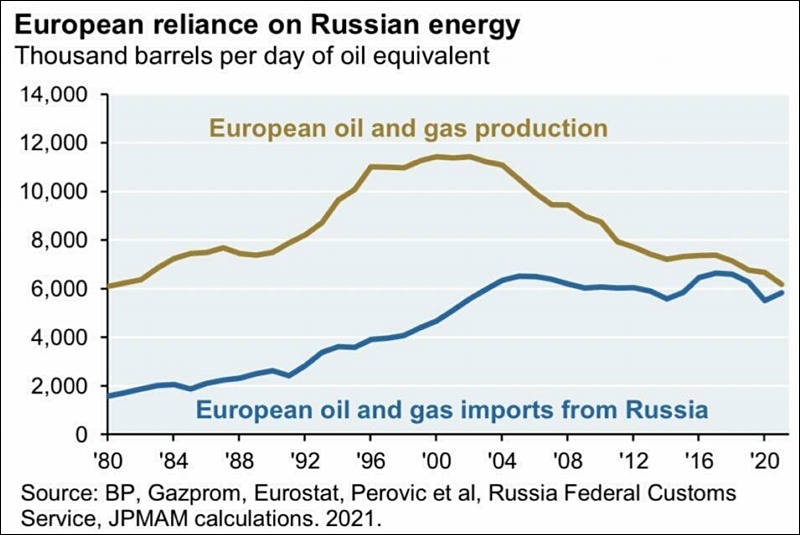
We must also note that up to 40% of other energy imports are being made using money that EU got selling products (chemical and more) made from cheap Russian commodities :-)
It is real dead end now.

 sa19536.jpg800 x 535 - 63K
sa19536.jpg800 x 535 - 63K -
Parliament of Bosnia and Herzegovina stopped all heating system due to rising fuel prices and supply disruptions.
-
Small update
The price of gas in Europe for the first time in history exceeded $3,000 per 1,000 cubic meters.
-
The price of gas in Europe again broke the record - $ 2,500 per thousand cubic meters.
And this is only start.
Howdy, Stranger!
It looks like you're new here. If you want to get involved, click one of these buttons!
Categories
- Topics List23,987
- Blog5,725
- General and News1,353
- Hacks and Patches1,152
- ↳ Top Settings33
- ↳ Beginners255
- ↳ Archives402
- ↳ Hacks News and Development56
- Cameras2,364
- ↳ Panasonic993
- ↳ Canon118
- ↳ Sony156
- ↳ Nikon96
- ↳ Pentax and Samsung70
- ↳ Olympus and Fujifilm100
- ↳ Compacts and Camcorders300
- ↳ Smartphones for video97
- ↳ Pro Video Cameras191
- ↳ BlackMagic and other raw cameras116
- Skill1,960
- ↳ Business and distribution66
- ↳ Preparation, scripts and legal38
- ↳ Art149
- ↳ Import, Convert, Exporting291
- ↳ Editors191
- ↳ Effects and stunts115
- ↳ Color grading197
- ↳ Sound and Music280
- ↳ Lighting96
- ↳ Software and storage tips266
- Gear5,420
- ↳ Filters, Adapters, Matte boxes344
- ↳ Lenses1,582
- ↳ Follow focus and gears93
- ↳ Sound499
- ↳ Lighting gear314
- ↳ Camera movement230
- ↳ Gimbals and copters302
- ↳ Rigs and related stuff273
- ↳ Power solutions83
- ↳ Monitors and viewfinders340
- ↳ Tripods and fluid heads139
- ↳ Storage286
- ↳ Computers and studio gear560
- ↳ VR and 3D248
- Showcase1,859
- Marketplace2,834
- Offtopic1,320


